
Repatriation is a bitch
Repatriation is one of the most underrated and intense phases of the whole process of temporarily living abroad. In this blog post, I want to show why that is, what you can do to prepare, and what you can expect. As always, I have used a mixture of academic papers, articles, and personal stories from within the expat community to create a valuable and comprehensive resource for you.
Like an old pair of jeans
Coming home after some time abroad can be like trying to fit into an old pair of jeans. You loved those jeans and wore them all the time but then your taste or your figure changed and somehow it does not fit any longer. It pinches and you can’t wait to take it off and change into your comfortable sweatpants in the evening. The country and neighborhood you once loved suddenly might feel like this way too tiny jeans. A place filled with memories from the past. You walk the same streets, meet the same people, or shop at the same places but somehow it has lost its sparkle and you begin to realize that you will need to put in a lot more effort and patience to make it work.

An individual experience but one you are not alone with
When you research the topic of repatriation and talk to families that went trough you start to realize how manifold this topic is.
The concept of culture shock walks you through the different phases and explains the development of adaptation over time. I have covered that concept here on the blog and within my latest ebook about the topic BECOMING CAREER SMART ABROAD.
Having frameworks like that help us to sort our feelings and realize that it’s more a phase than how we will feel forever from now on.
While most expats are going through the period of repatriation at least one day in their life there are many variables that make this experience unique. These variables affect how easy you will cope with repatriation. Here are just a few examples:
- Forced vs. Wanted repatriation
- Professional outlook back home
- Degree of adaptation to host culture
- Financial situation
- The career situation of the partner (now and after repatriation)
- Similar or totally different emotions about going back within the partnership
- Age of Children
- Time spent abroad
- Your personality
- So many more!
All these factors will make repatriation a very personal adventure. For each of you, repatriation will feel different. However, the beauty of this experience is that you will always find yourself understood by the ones that went through it. I gathered a couple of quotes about repatriation shared via social media. One of the quotes even inspired me to use it as the headline of this blog post 🙂
As you will see those quotes all show a unique angle of repatriation but I am sure you will resonate with at least some of them.
I hope scrolling through the experiences and advice by other expats, you get an idea of what to expect from repatriation and helps you to realize: It’s a process with a learning curve.
The unexpected cold welcome
When you are about to embark on a new international adventure you start to prepare mentally. When faced with the foreign culture we expect it to be challenging and different from what we know. The reverse culture shock, on the other hand, can feel like a punch to the stomach as we do not assume it to be tough. It’s like sitting in an exam situation realizing that we have prepared for the wrong topic.
When you just moved abroad and are struggling with adjusting, this phase seems far away. However just like you need to adjust to a new country, you need to re-adjust to your home country. This takes time and effort and many of us underestimate this period until we experience it ourselves. We expect to come home to the country we left but tend to forget two things:
- They have changed
- You have changed
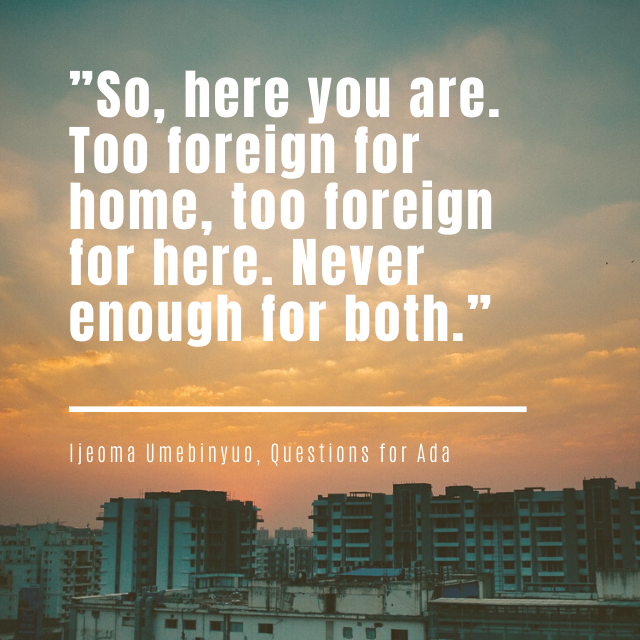
No one is waiting for me
In my coachings, I often heard the sentence „I realized no one was waiting for me“. Spending time abroad often can lead to a distorted picture of our relations back home. Social Media and video calls help us to maintain existing friendships back home but they are no guarantee that we can pick it up right where we left it when we return. Your friends most likely become annoyed when you start to compare everything with the country you just left. In case they never lived abroad they might not get the feeling you are having right now. And to be honest, how could they? Some things you have to experience yourself to fully understand it. At the same time, they might realize that you came back as a different person and it can be tricky to get the message across. You might feel insecure about it yourself and unsure whether this new hobby of yours or your view on having(or not having) a career will stick even back home.
We grow as a person when living abroad and challenge our believes, values, and way of thinking. You won’t return as the same person that left and trying to do so will just make it harder to adjust. When we become aware of the change that happened and question our goals and actions, returning home can bring a lot of possibilities to continue our personal journey of growth.

Not only a cultural change but a lifestyle change as well
The majority of expat partners get back into the job market – so it is not only a cultural change but a lifestyle change as well.
According to a survey by Expat Communication amongst expat partners, 74% have returned to work about three years after moving back. It that sense, besides the cultural aspects, coming home does also come along a significant change in what you do professionally. Many expat partners invested their time abroad in working in different fields than before, volunteering, family life, creating new hobbies and passions, or even discovered their entrepreneurial self. In some cases, returning back home brings along the necessity to contribute to the household by rejoining the workforce. While some women long for this moment and can’t wait to focus on their career, others started to realize what an amazing time they had focusing on creating their own routines abroad.
Bottom line: Career-related challenges faced by dual-career expatriate couples typically continue in the repatriation stage, and, in that context, the career challenges are ongoing.
Also, the next career step of the expat sent abroad by the company has to be negotiated. Some companies are paying attention to the fact that employees have to be reintegrated but unfortunately that is not always the case. Most expats careers are experiencing a promising lift leading to promotions. As you can see in the charts by BGRS, that is the case for about two-thirds of employees while only 6% are about to leave the company after returning. However, only 18% of the companies studied have formal repatriation programs for the employee. In most cases, employees are expected to use their network to shape their future career at the company. Depending on the economic situation of the company and the personality of the employee this will be more or less affecting the mood when repatriating.
So that brings a hell lot of change to the life of a person and the whole family. No wonder it takes about a year to feel comfortable again.

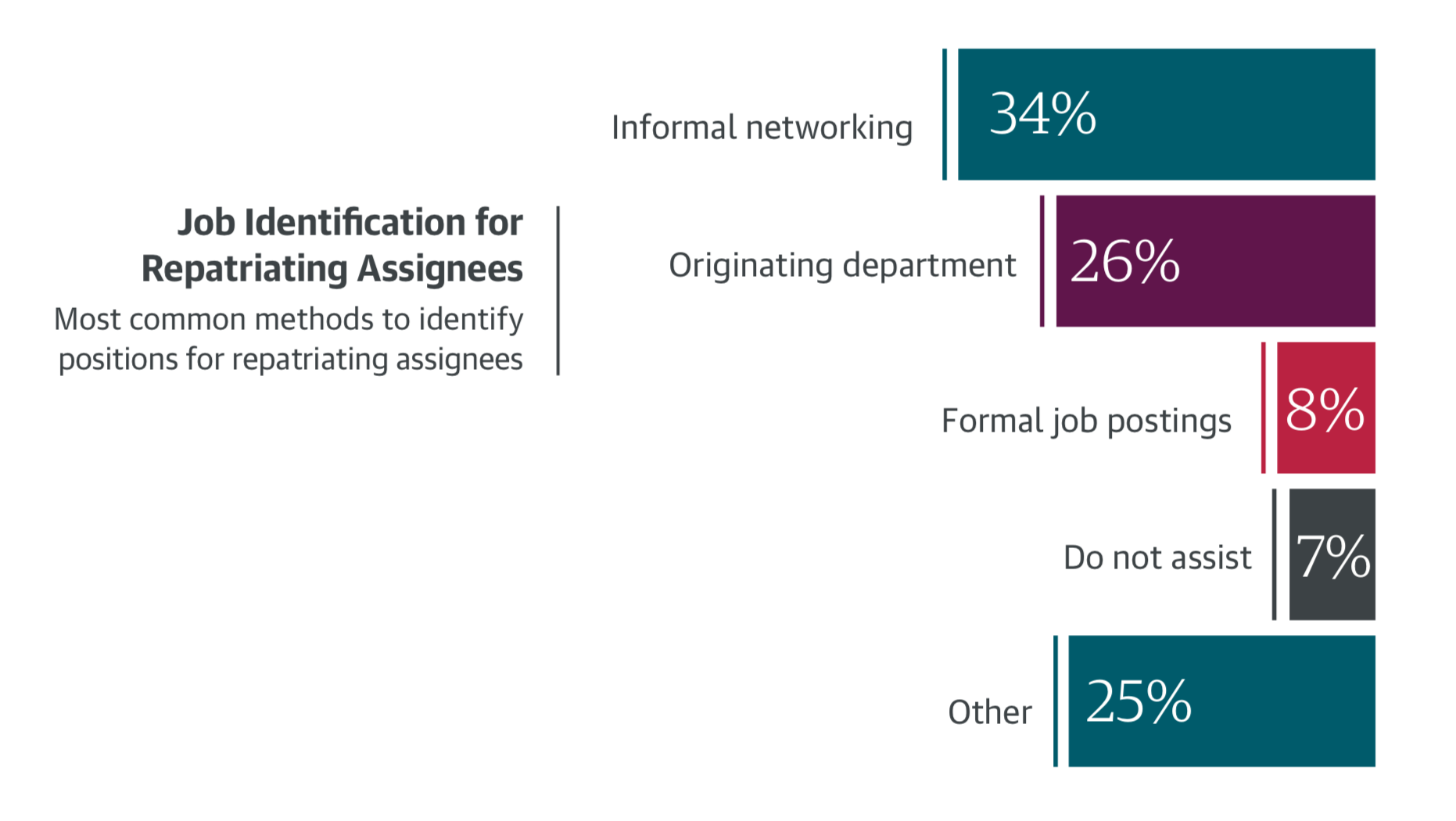
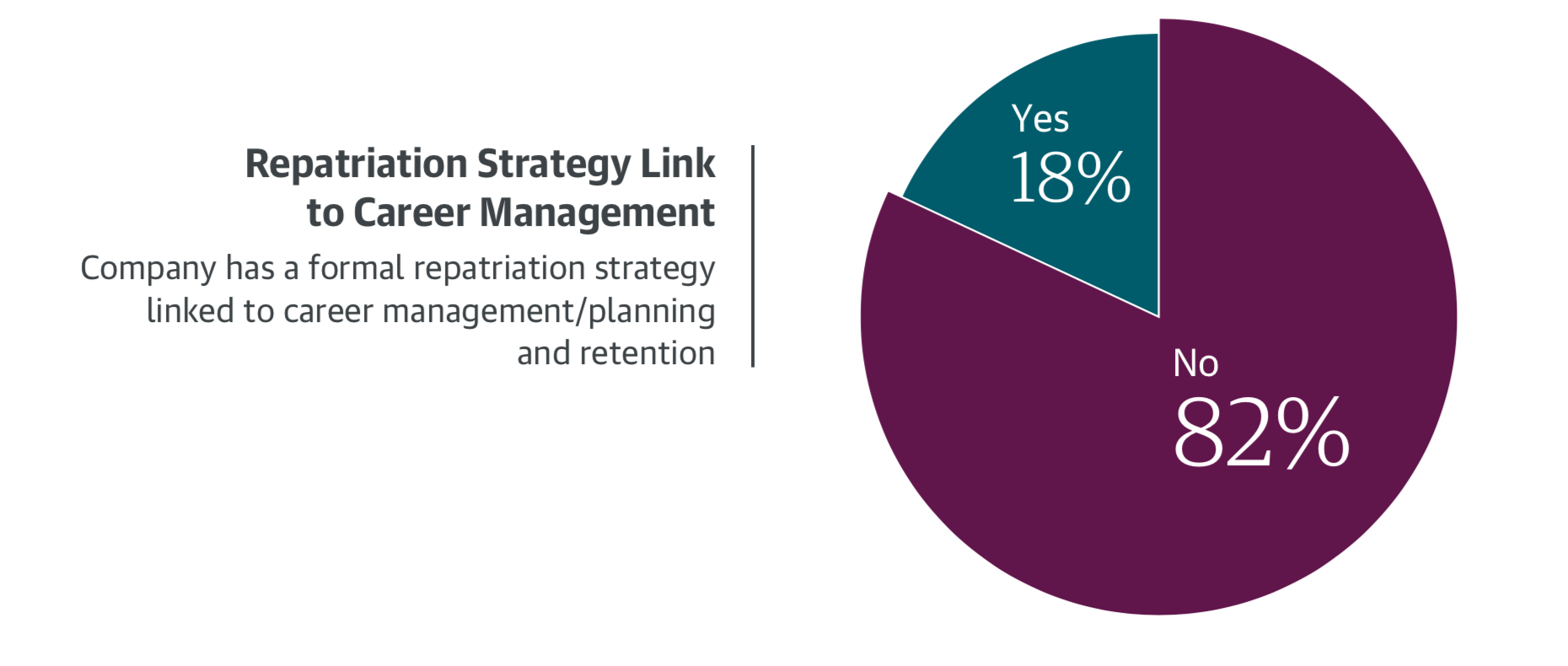
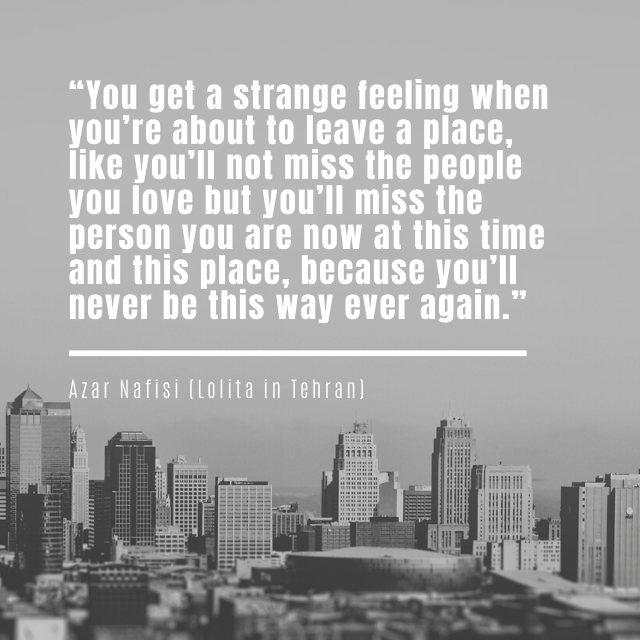
So what's the solution?
As there is a huge potential for failure, companies have realized that a reintegration program can help to ease the transition and not to lose the employee to the competition.
However, those reintegration programs should not only focus on work but also on family life. The expat partner him/herself is going through the process of reintegration with the difference that no employer is waiting most of the time.
From the academic papers available in the field of research right now and my practical experience from coaching clients with their expat experience, I came up with my 3-step-model for repatriation which I want to introduce to you in this blog post.

Step 1: Preparing for repatriation
Before you are moving back, it is essential to prepare for repatriation similar to your preparation for expatriation. Moving back is not easier than moving back just because it’s your familiar culture you are returning to. Studies show that US expats struggle a lot with their stay in the UK. The reason behind this is the gap between expectation and reality. When you anticipate something to go smoothly you might be shocked how foreign everything might feel (even though you share the same language and similar values). Expats that are going to embark to more exotic destinations are prepared for lots of change and are able to react with more patience and curiosity. The same is valid for your move back home. I find it helpful to think about how foreigners are experiencing your home culture. Thankfully there are tons of great blog posts and youtube videos out there that are comparing different cultures. Indulging yourself into this kind of material will help you to get acquainted with your own culture again. In my case, I will repatriate from the US back to Germany and I can highly recommend the videos by Wanted Adventure Abroad on YouTube. These videos by an American living in Germany help to become aware of cultural differences again on a not too serious level.
Create awareness for potential obstacles along the way
- over-romanticizing the time abroad
- unforeseen expenses due to the move and creating a new home and the missing expat package
- difficulties with reconnecting with former friends and family members
- struggling with finding a new routine back home
- feeling stressed out about all the uncertainties and living in between boxes
- tough partner dynamics especially when your partner feels different about moving than you (click here for a great article in German about that by expatehe.com)
Step 2: Reflection on who you are NOW
Be honest with your personal development.
The paradox of personal growth is that it can become a liability when it comes to repatriation. Living abroad has most definitely changed your perception of the world and on yourself to some extent. The rulebook of what is important to you and your core values might have to be rewritten. While your family and friends back home are still expecting the same person to return that has left a couple of years earlier this most probably will not be the case. Reflect on the change you went through and why you see some things different know. Think about the skills you have developed and the actions you made to feel at home abroad. Take the role of an observer and take a step back. What attitude/skill/value was useful abroad? Which ones do you want to take back home? What can cause irritations and what would even bring you further along with your goal? Remember that you don’t need to get rid of certain character traits but that you need to be aware of them. Need an example? Take for instance the way how we communicate with one another. Some cultures clearly address conflicts while others tend to focus on what is working out great and do not want to put obstacles into the spotlight. In case you have lived in an environment where you burry the bad news by using lots of compliments and avoid specifications you will struggle with going back to a culture where you address the issue right away to get things done. We are going through a cultural adaptation process when living abroad. Hence, we adopt certain cultural traits that helped us abroad but can cause misunderstandings abroad. Remember it’s not about changing again and getting rid of our learnings but become aware of them to be sensitive enough in everyday situations.
Helpful questions to ask yourself
- How can I make use of the experiences and skills gained abroad?
- Realistically, how much time will we need as a family to re-settle?
- Who do I know in my network to reach out to? Who will understand what I am going through and can help me along the way?
- What are the things I am looking forward to? What is my Bucket list for rediscovering my home country?
Step 3: Blending in
With a positive and proactive mindset (way easier said than done!) you will be able to find your place back home again. Within the first few months, keep in mind that this is a process. Similar to moving abroad we have to be patient and reflective to make it work. Allow yourself the same timeframe you needed when leaving your home country. You will feel alienated from time to time and the so-called reversed culture shock is nothing that vanishes overnight. Try to be aware of the fact that you have great and valuable perspectives to bring to the table but also keep in mind that you are not right by default. Stay curious about other peoples‘ lives and experiences. Be forgiving to situations and people that trigger something in you. We tend to be far less forgiving to our own culture but that does not help us to re-adjust. YOU GOT THIS!
I hope you found that overview and process valuable. Repatriation is a multifaceted topic and it’s important to raise awareness of its complexity. Please feel free to reach out if you are struggling and share this post with family and friends to ease the transition. Always remember: You are not alone in the process and nothing is set in stone!
Thanks for sharing the love and stopping by

Send this article to a friend & share the love:
THE 5 PHASES OF CULTURE SHOCK
Experiencing a culture shock is not always easy but it helps to approach the topic from the analytical side. In this article, I consider the culture shock model by Oberg. This model presents cultural adaptation abroad as a process of five phases. I give tips for each stage and share personal experiences.
THE EXPAT SYNDROM AND ITS BEST MEDICINE
Especially new Expats are struggling with the so-called Expat Syndrome: We tend to see only the negative parts of the new culture we are living in and praise our own culture from back home. Here is what you can do about it.
HOW EXPAT FAMILIES ARE COPING WITH THE CORONAVIRUS
How do expat families feel during a worldwide pandemic? How did they decide whether to leave or stay? I interviewed 5 families and they gave me a very interesting insight into their lives.

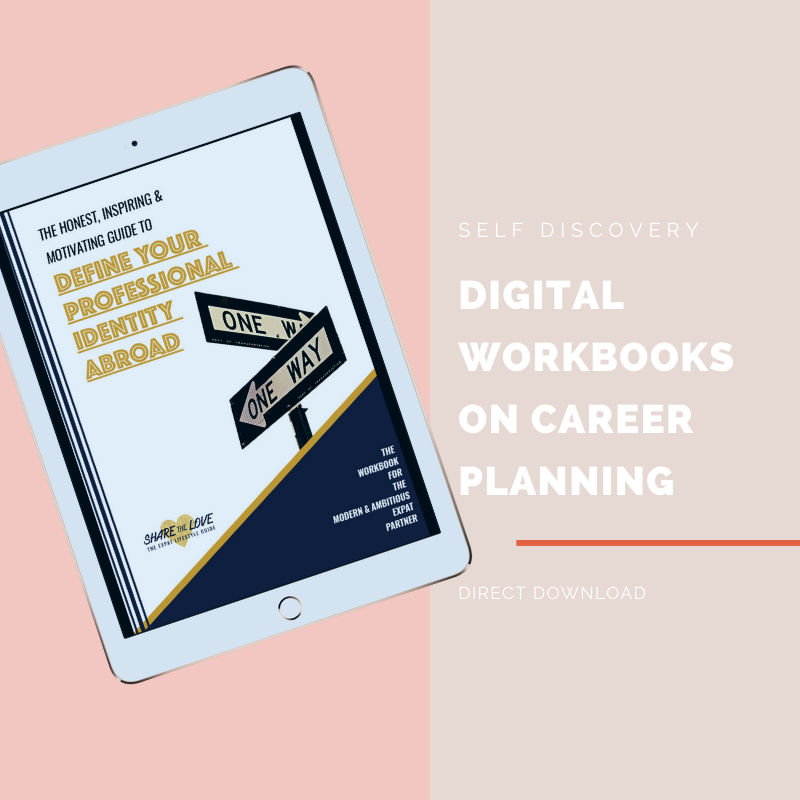


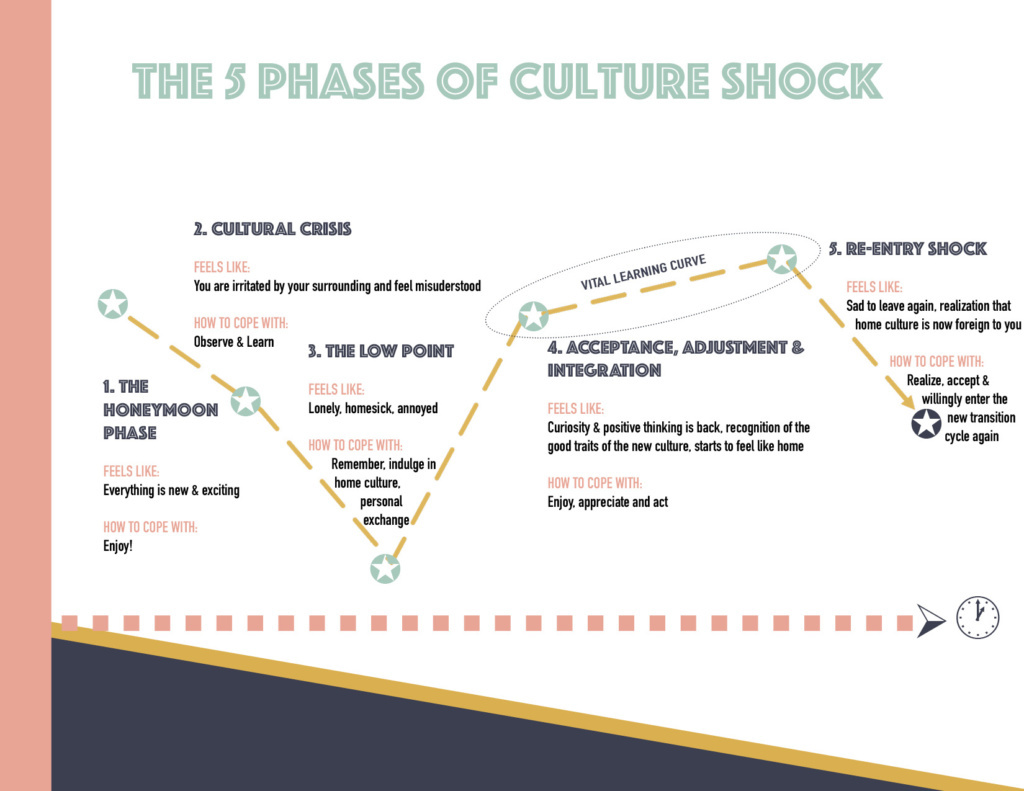








3 Antworten
Thanks for this. Repatriation is 5 months ahead, and I am struggling hard to keep the spirits up.
Beautiful to read and so many valid points! Repatriated to The Netherlands with my Dutch husband a few months ago and struggling to find my nee identity here… I miss who I was in Asia, adventurous and so different..! At the same time I love the nature here, history and culture. Step by step!
I really loved reading this article. it is really well researched and compiled.
After 20 years living abroad in 5 different countries am back in my home country now for 5 months. This is the first time that I saw somebody also talking about the circumstances (economic differences and consequences, wanting to return or not, what to do with your acquired knowledge that isn’t necessarily manifested in a degree etc., ). All of it is sooo difficult so it helps to know about the phases…